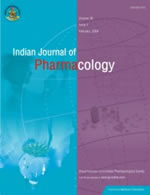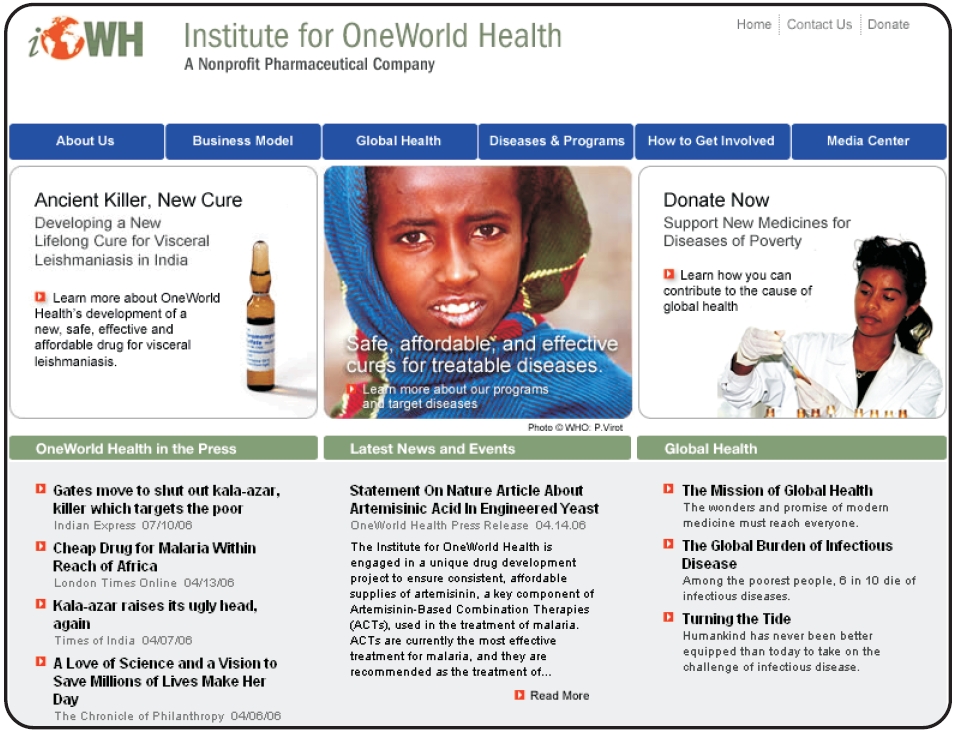
|
Indian Journal of Pharmacology
Medknow Publications on behalf of Indian Pharmacological Society
ISSN: 0253-7613 EISSN: 1998-3751
Vol. 38, Num. 4, 2006, pp. 305-306
|
Indian Journal of Pharmacology, Vol. 38, No. 4, July-August, 2006, pp. 305-306
Web-Wise
Institute for one world health
Singh J
Department of Pharmacology, JIPMER, Pondicherry - 605006
Correspondence Address:Department of Pharmacology, JIPMER, Pondicherry
- 605006, jatindersingh@vsnl.com
Code Number: ph06088
(www.oneworldhealth.org)

The world is fast emerging as a global community. Increasing interdependence
and the fact that the health of people influences the strength of national
economies has created an awareness amongst countries for the need for new,
integrated, and multidimensional approaches to global health. The shared concern
of different countries is to contain the rapid spread of health crises that
have shown an alarming propensity to disseminate across countries and continents.
Health threats include infectious diseases such as HIV/AIDS, malaria, and drug-resistant
tuberculosis, as well as emerging and re-emerging diseases such as SARS and
the threat of avian influenza. These challenges encompass social, political,
economic and biomedical dimensions and are best addressed through multidisciplinary
teams and interdisciplinary approaches.
Just as health problems can cross borders, solutions to these problems can
also be shared among countries. A number of initiatives by both governmental
and non-governmental organisations (NGOs) have sought to address the unfair
treatment of drug research and drug availability in the case of poorer nations
and neglected diseases. A new class of entrepreneurs with a unique business
model that relies on the basic human traits of social responsibility and altruism
have taken up the challenge of addressing the disproportionate allocation of
health resources that exist around the world. In a number of innovative ways,
they are applying time tested strategies to develop treatments and get them
to the people who need them most.
Dr. Victoria Hale a pharmaceutical scientist is one such trailblazer. Having
worked inside the drug industry for many years she realized that "appropriate drugs would never be developed because they would never make a profit" and the drugs that were already available were too expensive for people in the developing world. She went on to establish OneWorld Health in 2000 as the first non-profit pharmaceutical company in the United States, with a mission to develop "safe, effective, and affordable new medicines for those most in need". The website of the organisation (www.oneworldhealth.org) reveals its business model which includes identifying and translating promising new drug leads from academic institutes and industry into safe, effective and affordable medicines. This is accomplished by a dedicated team of scientists who work with the financial aid granted by various philanthropic organisations. The technical know-how for developing these medicines is then transferred to the developing countries so that their impact is maximised. This model is strongly in contrast to the functioning of the archetypal pharmaceutical company whose main interest is to garner profits by making drugs that are in high demand.
The website is a primer on the issues concerning global health problems,
the disparities which need to be tackled and possible solutions that can be
provided.
Concerns related to preventable diseases, orphan diseases affecting the poorest
of people and the interplay of poverty, marginalisation and non-availability
of medicines are also elaborately explained.
The drug development process of the organisation involves zeroing in on profitable
chemical compounds against target diseases. The positive leads are secured
by ensuring intellectual property rights and then optimised for clinical testing.
Clinical trials carried out in accordance with international norms evaluate
the safety and effectiveness of these compounds which are then submitted to
the regulatory authorities of the country where they would be useful and the
technology involved in their manufacture is transferred to a partner in that
country. Distribution of the medicines to the focus groups is usually done
through existing government systems.
The link "Diseases and Programs" showcases the products of the organisation; paromomycin for Leishmaniasis, azoles for Chagas' disease, synthetic artemisinin and a vaccine for malaria and the development medicines and vaccines for childhood diarrhoeas are particularly highlighted. A separate page goes on to explain the burden of infectious diseases, the historical use of antibiotics and vaccines and the rapidity with which new disease threats are alleviated with the judicious use of modern technology.
One of the various ways in which OneWorld Health finds drug leads is by collaborating
with pharmaceutical researchers and industry professionals in order to develop
medicines for non-commercial markets. The "How to get involved" link gives details of the issues involved in these partnerships. The "Media Center" consists of news, technical releases, articles and multimedia clips relating to the organisation. It showcases the novel mode of functioning and the acceptability of the Institute by various international bodies. A regular newsletter, "The Pipeline" can also be accessed from this link.
The concept of a non-profit pharmaceutical company is seemingly alien at
first but on going through the contents of the website the optimistic ideology
of
the company becomes apparent as do the dedication of the team and the approach
of the innovative business model. The website showcases how a unique idea
can work wonders for the good of humanity based on the tenets of innovation
and
teamwork. It is an excellent resource for people in the pharmaceutical industry,
academics, researchers, managers and entrepreneurs on the importance of global
health issues and innovations needed for their resolution.
Copyright 2006 - Indian Journal of Pharmacology
| 